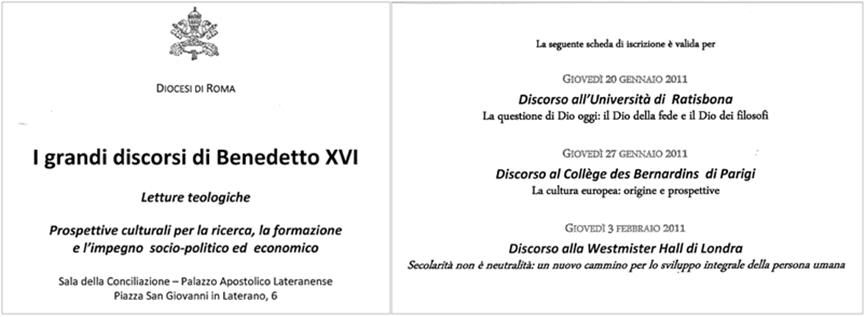
 BENEDICT XVI'S GREAT SECULAR DISCOURSES:
BENEDICT XVI'S GREAT SECULAR DISCOURSES:
Theological discussions for university students
Translated from the Italian service of


19 JAN 2011 (RV) - A cycle of three theological readings based on the great secular discourses of Benedict XVI in Regensburg, Paris and London begins tomorrow at the Vicariate of Rome headquarters at the Lateran.
Spnnsored by the Dicoessan Office for Pastoral Ministry in the Universities, the first discussion based on the Regensburg lecture takes place tomorrow evening. The two subsequent discussions will take place on the succeeding Thursdays.
Discussants for tomorrow's event include Mons. Enrico Dal Covolo,SDB, rector of the Pontifical Lateran University; Francesco D'Agostino, professor at the University of Rome in Tor Vergata; and Girgio Israel, professor at La Sapienza University.
Marina Tomarro interviewed Prof. Cesare Mirabelli, emeritus president of Italy's Constitutional Court, who will moderate the discussions.
PROF. MIRABELLI: The basic idea is not just to read through but to exame in depth the contents of these three major addresses by Benedict XVI and to do so in a way that will attract the scientific and academic world to consider these discourses seriously. Our discussions will take off from theological reflections.
The initiative also promotes the inclusion of theological culture into the university culture - a perspective that is lacking in our country, and which I believe would be very positive.
Is there a common thread running through these discourses?
Of course. The occasion for each one was different. The lecture at the University of Regensburg was in a fully academic context, made even more special because it was at a university where the Pope had been a theology professor, and the theme was a profound analysis of .
the relationship between faith and reason.
The Pope argues that reason should not be limited to what is experimentable, and he advocates that reason should be open to a much broader conception. That speech was probably the basis for all the others.
The second discussion evening will be devoted to his addrees in Paris, relating the search for God by the medieval monks to the development of European culture as we know it. And the third one, in London, was about the relationship between ethics and civilian authority.
In general, what they have in common is to give back to the religious element a spirit of freedom in the search for truth, and the place that it rightly has in the life of the individual and in social life.
Who is the primary audience for these meetings?
First of all, the university community. For some time now in Rome, there has been common work done not just among the state universities and the private ones, but also with the Catholic universities. Rome is like a great basin of university students, and it is valuable to make them aware of these discourses.
Nonetheless, the meetings are open to everyone, including the political and institutional world, in order to help develop the right commitment not only in educational matters, but also in the social, political and economic sectors.
Besides, the university itself cannot live within its own world - it must be able to relate to the world in which it finds itself.
Further information fronm the SIR report I first posted about this event last December 16:
On the Regensburg lecture, the evening seminar is entitled "The question of God today: the God of faith and the God of philosophers". Speakers will be Mons. Enrico Del Covolo, SDB, rector of the Pontifical Lateran University; Prof. Francesco D'Agostino, University of Rome at Tor Vergata; and Prof. Giorgio Israel, of La Sapienza University.
On the Bernardins address, the evening is entitled "European culture: Origins and prospects". The speakers are Mons. Sergio Lanza. Assistant Ecclesiastic-General of the Universita Cattolica Sacro Cuore; Prof. Giuseppe Dalla Torre, rector of Rome's LUMSA (Libera Universita Santissima Maria Assunta)' and Prof. Alessandro Ferrara, of the University of Rome Tor Vergata).
On the Westminster address, the evening is entitled "Secularity is not neutrality: A new way for integral human development". The speakers are Mons. Mario Toso, secretary of the Pontifical Council for Justice and Peace; Prof. Lorenzo Ornaghi, rector of the Universita Cattolica Sacro Cuore in Milan; and Prof. Antonio Marzano, President of Italy's National Council for the Economy.